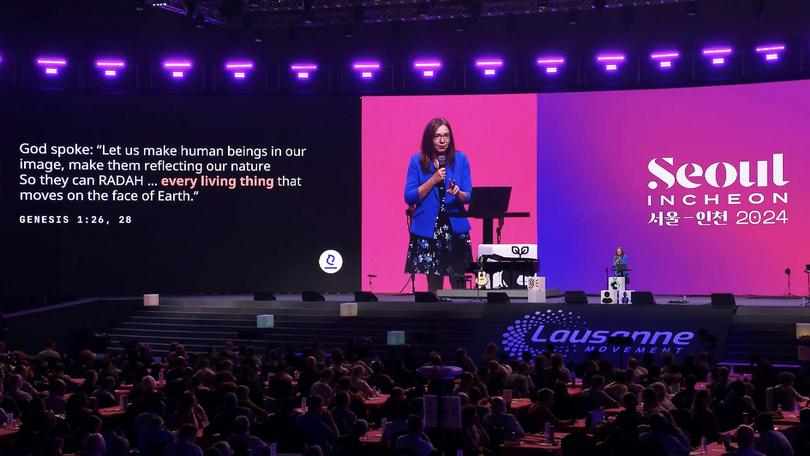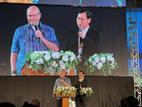Addressing the issue of creation care during the first evening session of Lausanne 4, Dr. Katherine Hayhoe, chief scientist of the Nature Conservancy and distinguished professor at Texas Tech University, urged attendees to treat this matter as integral to their faith.
Dr. Hayhoe opened her speech by clarifying that faith does not compete with science; rather, they complement each other, as the Bible is God's inspired written word and science is God's expressed word. Referring to Genesis 1:26, 28, she highlighted two key concepts: every living thing and radah.
First, every living thing includes plants, animals, and humans, with humans being among the neediest and most vulnerable. Dr. Hayhoe emphasized that God designed us to live in an interconnected ecosystem. She illustrated this interdependence through the example of a fungus known as white-nose syndrome, which affects bats, leading to increased pest populations, heightened pesticide use, and resulting in infant deaths.
The second point focuses on the word radah, a Hebrew term traditionally translated as "dominion over" or "responsibility for." In Psalm 72, radah signifies God's commitment to delivering those in need.
Dr. Hayhoe described the pressing issues of pollution, climate change, and the biodiversity crisis, noting that 70% of the world's animal populations have disappeared, a stark indicator of the biodiversity crisis. She pointed out that climate change is occurring faster than at any time in history, with 22% of heat-trapping gases stemming from deforestation and industrial agriculture, which also exacerbate pollution and biodiversity loss.
These issues are not distant concerns; for example, air pollution from burning coal, gas, and oil accounts for a third of all premature births worldwide and causes nine million deaths each year.
“Climate change affects us all, but it doesn't affect us all equally,” Dr. Hayhoe stated, emphasizing that those who are already vulnerable—who lack safe living conditions, sufficient food, and clean water—are the most at risk. “For me, this is not just a science issue; it's an issue of faith.”
She highlighted that countries in Southeast Asia and sub-Saharan Africa are disproportionately impacted by extreme weather compared to nations like Korea, France, and the United States. In Malawi, the rate of child marriage declined after legislation was enacted, only to rise again due to poverty exacerbated by frequent and severe droughts. Environmental issues are intertwined with hunger, poverty, housing, health, and, most crucially, justice and equity.
Dr. Hayhoe called on those who take the Bible seriously to advocate for and demand action on these issues, protecting both people and the other living beings most affected. She encouraged the audience to be bold, empowered by the Holy Spirit to act out of love.
What does it look like to act with love and a sound mind? Dr. Hayhoe suggested that while personal action is important, it is never enough. Systemic change is essential, and the most critical step is to engage in conversations about why these issues matter and what can be done collectively. She also urged attendees to partner with organizations working on climate justice.
She concluded her speech by sharing three encouraging insights from the science. First, every action matters concerning environmental issues. Second, one of the strongest tipping points for rapid change is framing these issues not merely as economic or environmental concerns, but as moral imperatives. Lastly, the primary reason people care about these issues worldwide is love—love for one another and for future generations is what motivates action.












